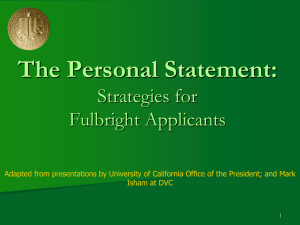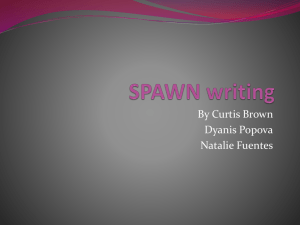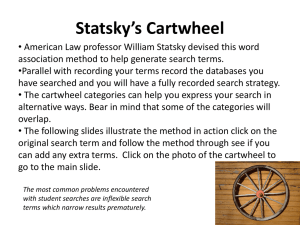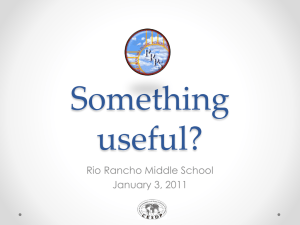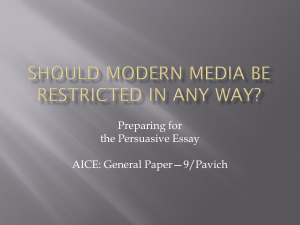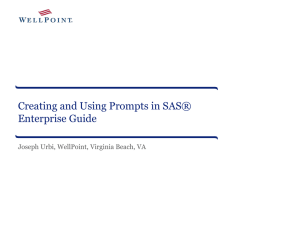Julius Caesar Essay
advertisement
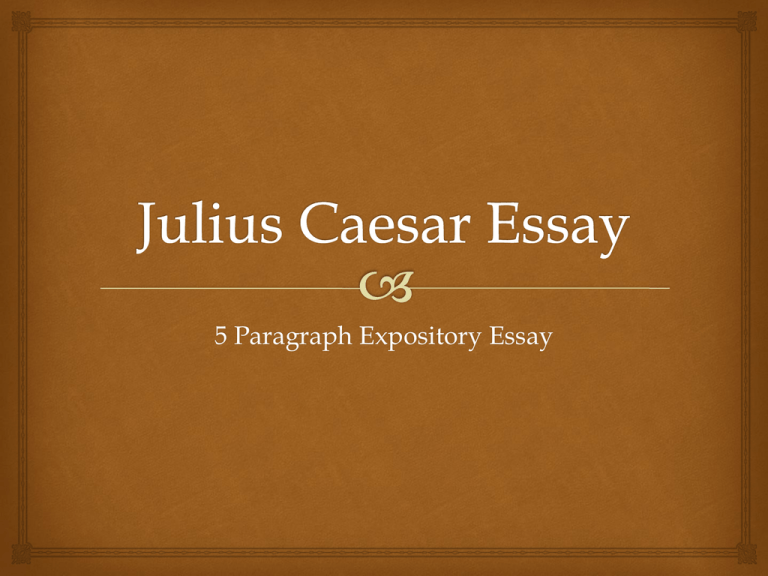
5 Paragraph Expository Essay Assignment Requirements Essay will be graded using a six-trait rubric Essay must be a minimum of 5 paragraphs Essay must be completed by no later than this Thursday to earn above a 70% All work must be completed in class. Work will be taken up at the end of the period and returned to you the following day for additional work All essays must use embedded quotes taken from the play to support your arguments. You must have a completed quote packet, a pre-write and a rough draft or your paper will not be graded! Pre-writing Your prewriting must have a minimum of a strong thesis statement, three topic sentences and two CD’s (Concrete Details) per body paragraph. The prewriting can take many forms such as a bubble diagram, three column chart or outline – just to name a few options. Rough Draft Your rough draft must be a reasonable first draft of your essay. It should be high-quality and the same length (5 paragraph) as your final product will be. To earn credit, and make your final draft eligible for grading, you must: Have editorial effort evident on your draft such as grammatical corrections, word choice alterations, sentence structure changes and reorganization/rethinking of ideas The final draft cannot simply be a copy of the rough draft. The Prompts You MUST choose one of the following prompts as the subject of your essay. You will keep the prompt sheet and attach it to your essay. CIRCLE the prompt that you have chosen to address in your essay. Your introductory paragraph should give a clear indication of which topic you have chosen as well. The Prompts You must use a minimum of six quotations from the play to support your argument. The prompts must focus on three of the four main characters (Brutus, Cassius, Mark Antony and Julius Caesar). All responses MUST include a discussion of the character of Brutus. The Prompts 1. In life we meet various people, some of whom we greatly admire. For example, we may admire them for their courage, honesty, loyalty, or commitment. Think of three characters from Julius Caesar who might be considered admirable. Based on your evidence, state in your conclusion who the most admirable person is of the three presented. The Prompts 2. E.M. Forster said, “If I had to choose between betraying my country and betraying my friend, I hope I should have the guts to betray my country.” E.M. Forester, Two Cheers for Democracy, 1951. Explain how three of the main characters from Julius Caesar do or not use betrayal of those close to them for political reasons. In your conclusion, state who, if anyone, had justifiable reasons for violating the trust of others. The Prompts 3. The concept of honor permeates this play. Define honor, citing references from the play. Discuss what three characters do or do not demonstrate the quality of honor, using specific quotations to support your argument. In your conclusion, indicate which character best demonstrates the characteristic of honor and how this proven within the play. The Prompts 4. In your essay, discuss the qualities of being a good or bad leader, using Caesar, Brutus, Cassius and Antony as starting points and identifying key qualities such as intelligence, vision, loyalty, judgment, self-knowledge, military skill and others. In your conclusion, indicate who is the most ethical or effective leader and why that person is best suited to lead in this play. The Prompts 5. The Greek tragic concept of hubris is demonstrated by several characters in this play. Define the term and then discuss how it affects the outcomes of at least three key characters. In your conclusion, indicate whether any character, because of their hubris, is the best example of a tragic hero as defined within Greek tragedy. The Prompts 6. “Brutus is not a dishonorable man; he is a mistaken one.” – Alice McPherson Julius Caesar (Living Literature Series), PermaBound Books, Visalia, Illinois, 1978. 2. How is Brutus a “mistaken” character and how do at least two other key characters contribute to his misunderstanding? IN your conclusion, indicate whether you believe Brutus’ mistakes are the result of the deception of others or his own character flaws. The Prompts 7. Think of a character in the play who has experienced self-discovery – that is, he has learned something important about himself. In your essay, briefly identify the three characters who undergo this self-discovery and its impact upon the character and others. In your conclusion, consider if the selfdiscovery would have altered the outcome if they had made this discovery earlier in the play. The Prompts 8. The Greek term hamartia means an “error, frailty, mistaken judgment, or misstep through which the fortunes of the hero of a tragedy are reversed.” The hero is not perfect and may make this error as a result of ambition, ignorance, or overwhelming pride. Discuss the concept of hamartia as it pertains to three of the main characters in the play. In your conclusion, explain which character demonstrated the greatest error in judgment or character which led to their downfall. The Prompts 9. One writer describes the “Roman notion of honor as name, fame or reputation” and discusses “public men who define themselves in terms of social role and reputation.” Discuss how three key characters allow their concern for name, fame or reputation (public opinion or perception) to cause their eventual downfall. In your conclusion, discuss which character was most concerned about social obligations or perceptions and thus had the greatest fall in the end. The Prompts 10. “Power tends to corrupt and absolute power corrupts absolutely.” – John Emerich Edward Dalberg Acton, Lord Acton, Letter to Bishop Mandell Creighton, April 5, 1887. Describe how three key characters in the play are corrupted as they pursue their political goals in the course of the play. In your conclusion, explain which character allowed themself to become the most corrupted and what that ultimately cost them in the long run.
